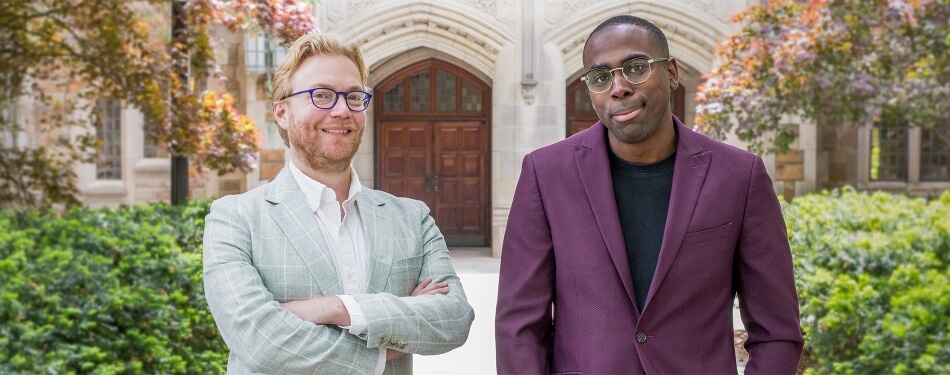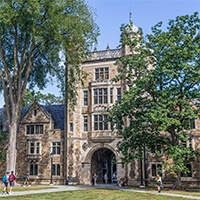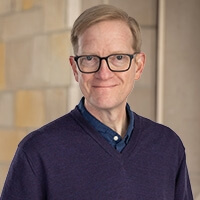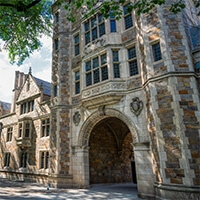Professors Daniel Deacon and Daniel Fryer, ’18, will present their research at the 2025 Harvard-Yale-Stanford Junior Faculty Forum, which will be held June 2–3. They are two of just 15 legal scholars selected from law schools across the country.
The Harvard-Yale-Stanford Junior Faculty Forum showcases the work of tenured or tenure-track professors who have not been teaching at either of those ranks for more than seven years. The forum provides these early career academics the opportunity to foster in-depth discussions about their papers and broader reflections on methodological issues. The forum is also designed to promote a stronger sense of community among American legal scholars, particularly between new and veteran professors.
“The work of Professors Deacon and Fryer exemplifies the cutting-edge scholarship emerging from Michigan Law and across the academy,” said Kyle Logue, interim dean and Douglas A. Khan Collegiate Professor of Law. “We’re delighted that they’ll share their ideas and engage with other outstanding junior scholars at the forum.”
Daniel Deacon: “Statutory Liquidation”

Deacon focuses on administrative law and communications law, and he has written about a broad range of topics, including agencies’ obligation to respond to alternatives to their chosen course of action, agency regulation of arbitration agreements, and the history and future of telecommunications and internet regulation.
His paper, “Statutory Liquidation,” which is forthcoming in the Administrative Law Review, assesses the US Supreme Court’s use of past agency practice to limit statutory grants of authority. In particular, it describes how, in recent cases, the court has indicated that if an administrative agency takes an action that the court views as deviating from its customary approach, that action is more likely to be deemed unlawful.
“The article is largely critical of the court’s turn, arguing that its use of practice is out of step with the court’s professed commitment to textualism and inappropriately privileges certain goals, such as the protection of reliance interests, over others, such as the promotion of government responsiveness,” said Deacon.
Deacon’s work has appeared in journals such as the Columbia Law Review, the Virginia Law Review, and the Yale Law Journal, in addition to the Administrative Law Review.
Reflecting on his acceptance to this year’s Harvard/Yale/Stanford Junior Forum lineup, he said, “I’m honored that ‘Statutory Liquidation’ was selected for the 2025 Harvard/Yale/Stanford Junior Faculty Forum, and I’m excited for the opportunity to present the paper.”
Daniel Fryer: “Reforming Abolition”

Fryer’s work draws on scholarship in social and political philosophy, law, history, and public policy. His current research focuses on criminal justice reform, race, and reparative justice.
His paper, “Reforming Abolition,” aims to clarify debates around the contemporary abolition movement and offer a framework for thinking about the areas of our criminal legal systems that call for change.
Fryer is most interested in thinking about abolition as a political project or social movement and less interested in thinking about abolition as—what philosophers would call—an ideal theory. One irony of the movement, he noted, is that there are times when some on the far left of the ideological spectrum criticize progressive reformists and instead align with right-wing libertarians who endorse an absolute eradication of aspects of our penal system. He believes this is due to emphasizing the wrong features of abolitionism in contemporary discourse.
“This paper is my attempt to alter the terms of the debate so that abolition could primarily serve its political mission and not get bogged down in debates that have little upshot today,” he said.
Fryer’s “Reforming Abolition” is part of a trio of papers. “Idealizing Abolition” was published in Criminal Law and Philosophy in 2023, and “Policing the Privileged” is expected to be featured in a volume on policing by NOMOS, a series published by the American Society for Political and Legal Philosophy.
“I look forward to participating in the forum and getting feedback on this paper—it will be nice to hear what others think of this draft,” he said. “I also very much look forward to discussing the papers by other junior faculty across the country.”







